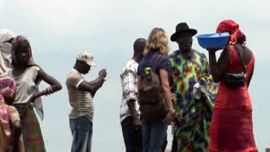
Corporations on trial – update
People & Power looks at five cases of multinational companies being held to account.
Last year People & Power ran a series of special reports on five cases of multinational companies being held to legal account by ordinary people.
The charges against them ranged from environmental damage and corruption to unlawful killing and even war crimes.
Ten months later, People & Power returns with an update on those Corporations on Trial.
One of the most disturbing of those films dealt with the biggest class action in British legal history – but it was not about the UK.
| In depth | ||
|
In August 2006, waste from the processing of crude oil was illegally dumped in and around Abidjan, the largest city in Ivory Coast in West Africa.
Last year, represented by a British law firm, 30,000 Ivorians brought a case against Trafigura, the world’s third-largest independent oil trader, which owned and shipped the waste, and who had contracted a local company in Ivory Coast to dispose of the waste.
The complainants alleged that the material was toxic and 100,000 people were forced to seek medical treatment. This gave them, they said, a clear cut case for compensation.
So what happened to that case?
Last summer the two sides reached an out of court settlement, which included a financial package, where each claimant was awarded $1,500.
The settlement package also included a statement issued by all parties to the litigation, which said that experts – jointly commissioned by the company and the claimants – agreed that a link between the slops and the deaths and chronic medical problems (including the skin conditions such as those shown in our special report broadcast last year) had not been established. The full statement can be read here.
The next update is less about compensation than straightforward justice.
Like many Palestinian villages in the occupied West Bank, Bil’in has been divided by Israel’s so called security wall – a fortified barrier that has cut people off from their own land and had a devastating effect on the fabric of their lives.
To work their farms on the other side of the wall Bil’in’s residents must have permission from the Israeli military. Once there they can only watch as illegal Isreali settlements spring up on their property.
In 2006, after widespread protests, the Israeli supreme court ordered a halt to the construction of these settlements and a re-routing of the barrier. But the verdict had little effect.
So, as we reported last year, the people of Bil’in launched a landmark legal action – not against the Israeli government – but against the foreign construction firms who have been building the settlements.
One of the most striking features of our Corporations on Trial series was how ordinary people found the courage and determination to pursue justice through the courts, even though success in some cases seemed a very long way off.
This resolve was clearly in evidence in the three other stories we covered, each from a different part of the world and each stemming from a very different set of circumstances.
An Alaskan village sinking into the sea gave rise to a case against multinational energy providers accused of causing global warming.
In Colombia we heard about a major US fruit producer and claims that it had financed death squads during that country’s dirty war on communist insurgents.
And from Indonesia came a remarkable tale of a muddy volcano, the havec it wrought on thousands of lives and the attempts to prove that a company with links to the government had been ultimately responsible.
This episode of People & Power aired from Wednesday, March 10, 2010.

 Q&A: Putting corporations on trial
Q&A: Putting corporations on trial